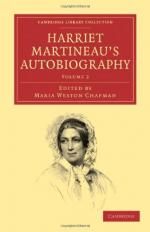|
This section contains 11,480 words (approx. 39 pages at 300 words per page) |

|
SOURCE: Winter, Sarah. “Mental Culture: Liberal Pedagogy and the Emergence of Ethnographic Knowledge.” Victorian Studies 41, no. 3 (spring 1998): 427-54.
In the following essay, Winter examines to what extent some of Martineau's works can be considered ethnographic studies.
No one seriously doubts that teaching is educational only in as far as, by its very nature, it has the capacity of exerting a moral influence on the way we are and the way we think; in other words, in as far as it effects a transformation in our ideas, our beliefs and our feelings.
—Emile Durkheim, The Evolution of Educational Thought (336)
At the end of Eastern Life, Present and Past (1848), an account of her travels in 1846-47 in Egypt, Palestine, Jordan, and Syria, Harriet Martineau attempts to distill her experiences in a reflection on the historic importance of the East, “the birth-place of the Ideas which have hitherto governed mankind.” She...
|
This section contains 11,480 words (approx. 39 pages at 300 words per page) |

|


